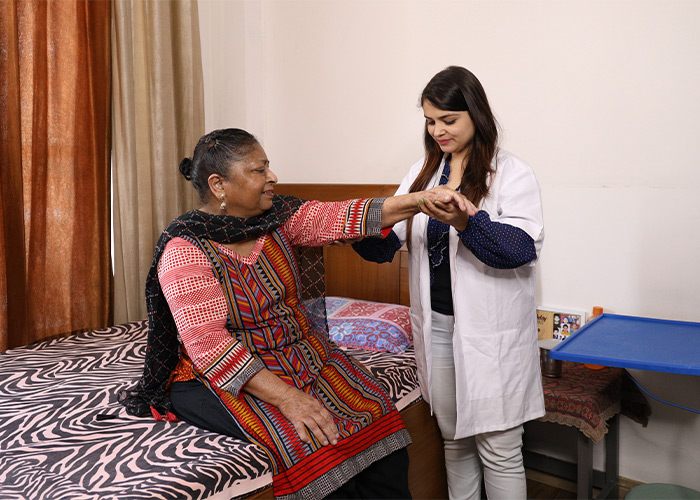Statistics state that during the Covid-19 pandemic, four out of ten Indian millennials took on a caregiving role for the first time, a figure much higher than the global average of 20%.
Caring for loved ones can be a gratifying experience. However, providing care can be demanding and even overwhelming at times. It is necessary to be available “on-call” round the clock, but that may not be always possible. This is where Home Healthcare can be incredibly beneficial to individuals in need.
Who is a Caregiver?
A caregiver, in simple terms, is someone who looks after the needs of someone with short or long-term limitations. A diseased adult, a bed-ridden patient or an old-aged person may require assistance. They may need assistance due to an accident, disease, handicap, etc.
Types of Caregiver
Here are brief descriptions of different types of caregivers to give you an idea of what they do routinely.
Family Caregivers are those who care for members of their family. A family caregiver provides daily or intermittent emotional, financial, nursing, social, homemaking, and other services to a sick or disabled loved one at home.
Professional caregivers are employed to provide care in the home or a facility. These caregivers can provide medical as well as non-medical care. Their job is to assist clients in a way that allows them to be as self-sufficient as possible.
There are several professional caregivers like qualified doctors, nursing staff, medical attendants, physiotherapists, etc who can offer daily medical needs and support to persons who require assistance.
Volunteer Caregiver works in a hospice or respite facility. They provide non-medical company, supervision, and a friendly new face for a special needs individual while the caregiver is away.
Private Duty Caregiver helps with a variety of tasks, including medical and nursing care, bill-paying, and transportation. They are a companion to the patient. Private duty caregiver could be a nanny who looks after one or more kids in a family. A babysitter or nanny’s duties include taking care of kids, their food, routine activities and overall health.
An informal Caregiver is a family member, friend, or neighbor who gives unpaid care to someone with whom they have a personal bond. An informal caregiver differs from a family caregiver in that they are not usually directly related to the care receiver.
Job responsibilities of a Caregiver
In the home healthcare business, the caregiver plays an important role in assisting the patient and meeting their needs. Job responsibilities may differ according to the patients’ needs and levels of caregiving.
Here are some of the job responsibilities of a caregiver:
- Helping clients with daily activities such as bathing, dressing, grooming, toileting, moving, activities, and meals.
- Serving meals and assisting with meal preparation; encourages clients to follow a healthy diet.
- Maintains client’s records daily such as documents medication, observations, reports any changes in resident’s physical condition and behavior, observes and reports all changes.
- Assists clients in taking medication.
- Nursing Caregivers are trained enough to render hospital equivalent care including RT Feed administration, Urine Catheterization and Administration, Injection / TPN Administration, Bed Sore Dressing, Stoma bag Administration and various other procedures.
Career roadmap of Caregiver
The health care business offers several opportunities for those looking to change careers. Here are some of the options for potential caregivers as a career.
Pursuing specialization
Continuing education is frequently provided by home healthcare businesses, depending on your present employment status. Many community colleges and healthcare organizations in the area also provide the lessons and courses required to acquire a home care certification.
As a trainer or manager
Caregivers who enjoy sharing their knowledge and skills could make good caregiving managers or trainers. These professions are especially significant because they help the industry and the local community maintain a consistent flow of caring, competent workers by training others to become capable caretakers.
Assisting families in caregiving
When caring for a loved one becomes unmanageable, family caregivers frequently don’t know where to turn. As a home healthcare specialist, you’ll utilize your compassion, knowledge, and caregiving abilities to examine a potential client’s condition, establish their needs, and talk with the family about the care recommendations.
Better pay scales and high demand
During the COVID era, the need for Home Healthcare has grown and the remuneration has seen a steep hike accordingly. Added employment benefits have also seen an upswing. Benefits could include compensation for driving time as well as receiving a guaranteed wage based on hours rather than units.
Privilege to make a difference
In addition to providing fulfilment and happiness, the profession entails making a positive influence on the lives of clients. Home health care is a well-respected profession that helps people live better lives.
Why should I become a Caregiver?
- Caregiving is a noble profession and a satisfying and fulfilling experience which can contribute to a better life for the client.
- Caregivers work from the homes of clients giving them a unique sense of freedom.
- You don’t want to devote many years to formal school but are willing to learn new skills and continue education to do good work with financial independence.
- Along with career opportunities, you can enjoy work flexibility and independence in your workspace.
Healthcare is like a three-legged stool; One leg of the pedestal is family caregivers, another is professional caregivers, and the third leg is the care recipient. Without all three legs, Health care may not be as effective as it should.
Zorgers Home Healthcare has 8 years of caregiving to its credit and around 4500 caregivers have been attached to us at some point or the other. We take pride in attracting and nurturing the exceptional talent and grooming them to be responsible Healthcare professionals.





Thank you for writing this amazing blog. For more information visit Pranyaas